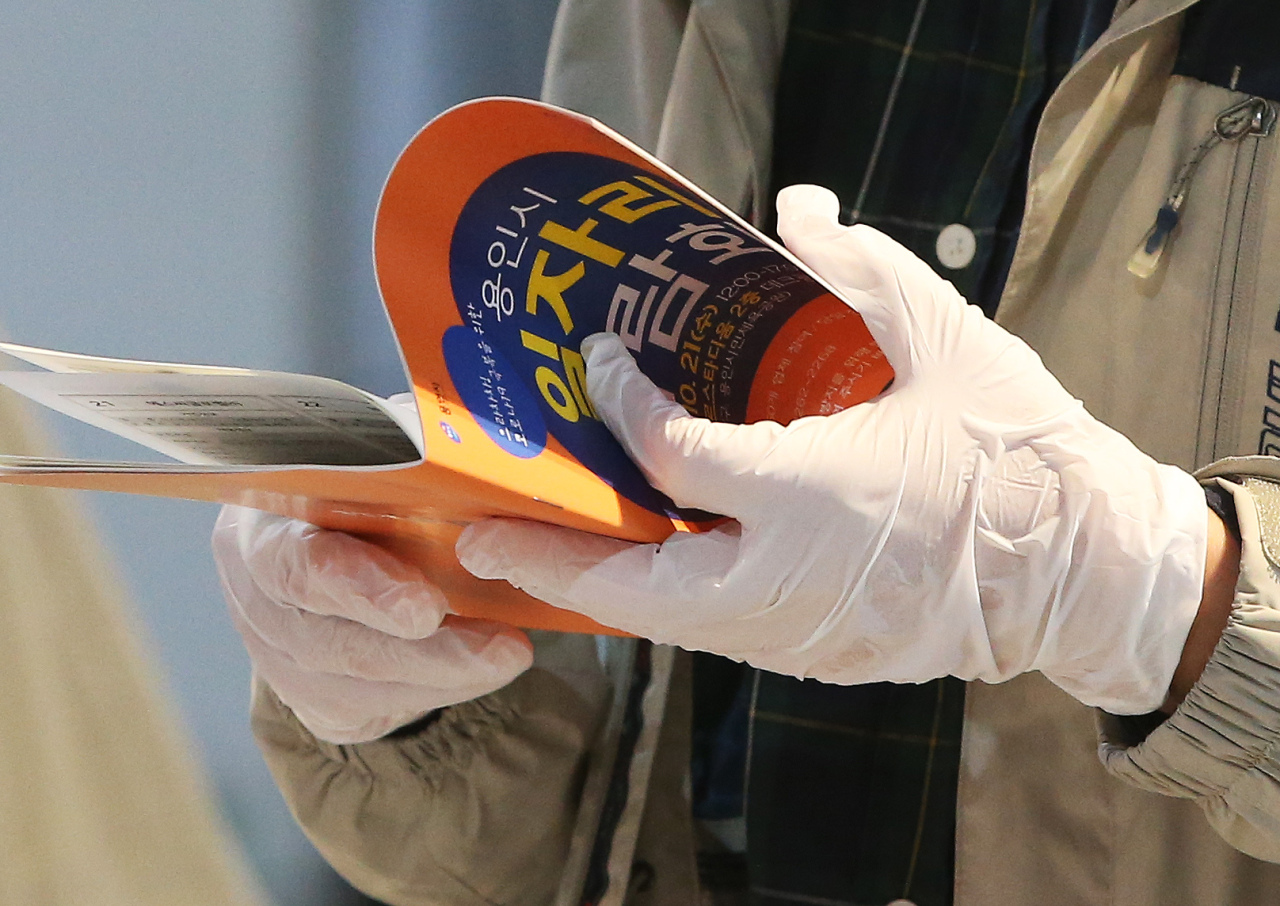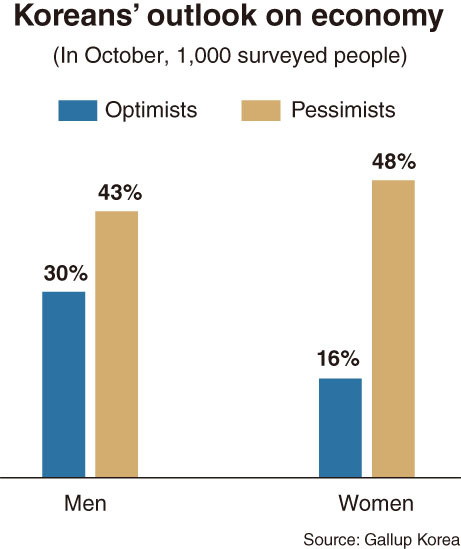[News Focus] On economy, pessimists outnumber optimists for 29 consecutive months
National debt tops 800 trillion won for 1st time
By Kim Yon-sePublished : Nov. 3, 2020 - 16:21

SEJONG -- It has been found that nearly half of South Koreans were still pessimistic about economic conditions, far outnumbering optimists, a survey showed.
According to a poll conducted on Oct. 27-29 by Gallup Korea, 46 percent of the 1,000 respondents said that economic conditions would deteriorate in the coming year.
Only 23 percent were upbeat about the economy. Another 27 percent said the economic conditions ahead would remain roughly the same.
Further, pessimists outnumbered optimists for the 29th consecutive month since June 2018. The pollster has conducted the economy-related survey during last week of each month.
By region in October, Daegu-North Gyeongsang Province topped the list in the proportion of pessimists, with 54 percent. Busan-Ulsan-South Gyeongsang Province ranked second with 52 percent, followed by Gyeonggi Province-Incheon with 50 percent and Seoul with 41 percent.
The percentage of optimists was at 19 percent in Daegu and North Gyeongsang Province, 18 percent in Busan, Ulsan and South Gyeongsang Province, 21 percent in Gyeonggi Province and Incheon, and 26 percent in Seoul.
According to a poll conducted on Oct. 27-29 by Gallup Korea, 46 percent of the 1,000 respondents said that economic conditions would deteriorate in the coming year.
Only 23 percent were upbeat about the economy. Another 27 percent said the economic conditions ahead would remain roughly the same.
Further, pessimists outnumbered optimists for the 29th consecutive month since June 2018. The pollster has conducted the economy-related survey during last week of each month.
By region in October, Daegu-North Gyeongsang Province topped the list in the proportion of pessimists, with 54 percent. Busan-Ulsan-South Gyeongsang Province ranked second with 52 percent, followed by Gyeonggi Province-Incheon with 50 percent and Seoul with 41 percent.
The percentage of optimists was at 19 percent in Daegu and North Gyeongsang Province, 18 percent in Busan, Ulsan and South Gyeongsang Province, 21 percent in Gyeonggi Province and Incheon, and 26 percent in Seoul.

Pessimists also outstripped optimists in portion in the Sejong, Daejeon and Chungcheong region and in the Gwangju and Jeolla region.
Women were more pessimistic than men. Of them 48 percent had a negative outlook, while 16 percent were upbeat, while the respective figures for men were 43 percent and 30 percent. This was a reversal from previous months, during which pessimism had been stronger among men.
By job status, only 11 percent of college students predicted an improvement in the economy in the coming year, followed homemakers with 16 percent and service industry employees with 21 percent.
The portion of optimists were only 14 percent among self-identified conservatives, 22 percent among centrists and 32 percent among liberals.
By generation, pessimism was strongest among those in their 30s and 50s with 50 percent, followed by the over-60s at 47 percent, and 20-somethings at 44 percent. Pessimism was lowest among those in their 40s with 37 percent.
Meanwhile, optimists outnumbered pessimists by 37 percent to 23 percent among supporters of President Moon Jae-in. But pessimists outnumbered optimists by 68 percent to 11 percent among those who expressed disapproval of Moon.
Gallup Korea, in a similar vein, conducted a survey on prospects on respondents’ living conditions in the coming year.
The percentage of people who responded that their living conditions would improve, stood at 18 percent, while 30 percent of those surveyed predicted worsening household conditions.
The nation’s outstanding household debt -- the total of financial loans and credit-based payment services extended to households -- reached a record high of 1,637.3 trillion won ($1.44 trillion) in June 2020, the Bank of Korea data showed.
The total has risen by about 250 trillion won since the Moon Jae-in administration took office in May 2017.
This data indicates that the Moon administration has failed to put the brakes on the increase in debt that started in the preceding Park Geun-hye administration.
The heavily indebted situation of households is also hampering private consumption and is eventually likely to slow economic growth.
Meanwhile, South Korea’s national debt is estimated to have surpassed 800 trillion won for the first time. Calculations from the National Assembly Budget Office showed sovereign debt reached 801.9 trillion won as of Tuesday.
The growth pace is proving serious in the wake of the administration’s active allocation of supplementary budgets.
By Kim Yon-se (kys@heraldcorp.com)




![[Herald Interview] 'Amid aging population, Korea to invite more young professionals from overseas'](http://res.heraldm.com/phpwas/restmb_idxmake.php?idx=644&simg=/content/image/2024/04/24/20240424050844_0.jpg&u=20240424200058)












![[KH Explains] Korean shipbuilding stocks rally: Real growth or bubble?](http://res.heraldm.com/phpwas/restmb_idxmake.php?idx=652&simg=/content/image/2024/04/25/20240425050656_0.jpg&u=)

